Microloans Bring Macro-Benefit to Detroit
When the banks won’t answer the door, the smallest of small businesses
can go knocking on the doors of Detroit’s microloan programs, which are
changing the face of the city one coffee shop or high tech start up at
a time.
Boyga Adeseye made a safe bet that operating his new business out of
the trunk of his car would appear, shall we say, less than professional.
If
his new business Talents of Motown LLC, a talent agency and promotional
company, was to go anywhere, he needed a respectable office. So Adeseye
went to the bank to apply for a loan — in fact, he went to two banks.
They both turned him down.
“We got two slaps in the face,” says Adeseye. 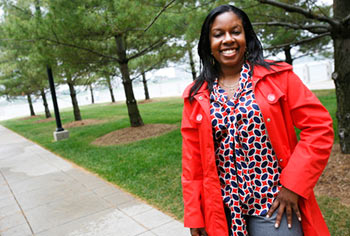
That
was when he turned to the Small Business Detroit MicroLoan Program, a
partnership between the Detroit Mayor’s Office of Neighborhood and
Commercial Revitalization and the Center for Empowerment and Economic
Development. The program offers loans to small businesses that can’t
obtain funding from traditional sources like banks.
“We really
want to support businesses that are sustainable businesses,” says Robin
Duncan, business development manager for the Small Business Detroit
MicroLoan Program.
Adeseye obtained the loan, and now Talents of Motown has a home in the Dime Building in downtown.
“I’m
just a firm believer in people having a vision and pursuing it,” says
Adeseye. “The more money that goes to small businesses, the better the
economy of Detroit will be. We have to make sure we support as much as
possible those who want to make Detroit a better place.”
That’s pretty much what the people behind Detroit’s microloan finance institutions were thinking, too. 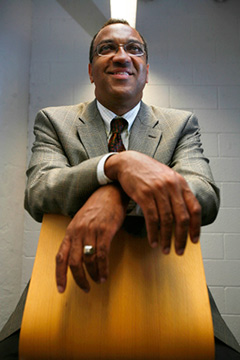
“Banks
aren’t going to take a lot of risk,” says Lorenzo Thurman, executive
director of Detroit Micro-Enterprise Fund, a nonprofit organization
started in 2004 as part of a grassroots community effort to provide
loans to underserved businesses in Detroit, Highland Park and
Hamtramck. “That’s why we’re here.”
Shelia McBride, for one,
is grateful they are here. McBride is founder of GradeCheck, a
Detroit-based company that provides academic guidance to high school
students hoping to be eligible for an athletic and/or academic
scholarship. When she wanted to expand her business to include a
national online database, she believed she wouldn’t qualify for a
traditional loan and turned to the Micro-Enterprise Fund.
“It
was important for me,” says McBride. “Obviously I had nowhere I could
turn. It was really a boost for me. I really appreciate them believing
in me and giving me help when I needed it.”
How it works
Microloans
aren’t a new concept, having been around for more than two decades and
providing those with less-than-stellar credit or entrepreneurs with
little to no capital the chance to start a business.
But their
popularity is rising in recent years thanks to a skittish credit market
and tight-fisted loan institutions still smarting from the subprime
mortgage collapse last fall.
“A lot of times banks are going
to focus on your credit score,” says Thurman, “and if your credit score
isn’t at least 680, most banks won’t touch you.”
According to
the Association for Enterprise Opportunity, a microenterprise is a
business with five or fewer employees, needing a loan of no more than
$35,000 and typically one proprietor. The AEO estimates that these
types of businesses make up more than 85 percent of businesses in the
U.S. 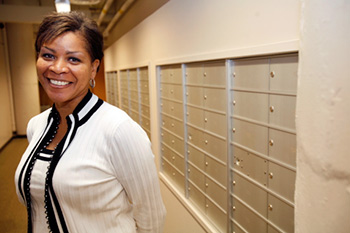
Unlike traditional lending institutions, microloan
organizations usually offer some sort of business counseling and
mentoring. In the case of the Small Business Detroit MicroLoan Program,
orientation classes are required to qualify.
After the loans are
granted and a repayment schedule in place, the Micro-Enterprise Fund
and MicroLoan Program still offer follow-up help in the form of
workshops or business training.
Microloan financing does
require a certain element of risk, seeing as how the lending goes to
entrepreneurs who are either unproven in the business world or have
otherwise bruised their credit.
The Detroit Micro-Enterprise
Fund, for example, will review an applicant’s whole story not just a
bunch of numbers, says Thurman. In other words, if applicants don’t
have a good credit score, do they at least make payments on time? Do
they show passion and dedication to their businesses?
“Basically,” says Thurman, “what we do is character lending.”
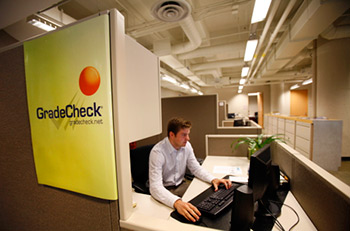 The
The
amounts of the loans vary. The Detroit Micro-Enterprise Fund is funded
by grants and fund-raising and lends up to $10,000 to start-ups and up
to $25,000 for established businesses located in Detroit, Highland Park
and Hamtramck. The Small Business Detroit MicroLoan Program, funded by
the Casino Business Development Fund, will loan up to $35,000 to
businesses located within Detroit city limits.
Economic impact?
The
biggest distinction between banks and microloan organizations is in
their ultimate reason for existing. Banks are banks, and they exist to
circulate money and investment to boost the credit markets. Microloans
don’t aim to show up on the NASDAQ anytime soon. Instead, to hear
supporters tell it, they’re as much about helping one business as they
are about spurring economic redevelopment in struggling communities.
It’s about “really doing outreach,” says Duncan. “It’s about community outreach.”
She
adds the MicroLoan Program is currently focusing on businesses in the
dense Southwest Detroit area, offering business roundtables and
networking events in the area. In February, the MicroLoan Program
helped fund popular coffeehouse Cafe Con Leche’s move to 4200 W. Vernor
and Scotten. 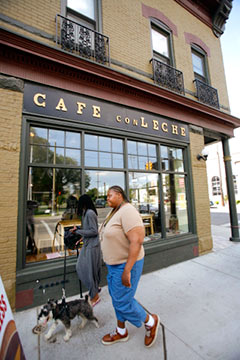 “We believe by supporting small businesses, that is spurring and assisting the revitalization of the city,” says Duncan.
“We believe by supporting small businesses, that is spurring and assisting the revitalization of the city,” says Duncan.
But
with huge companies like GM and Chrysler at their respective economic
precipices, can helping a small community coffee shop truly make any
difference to Detroit as a whole?
Vittoria Katanski, marketing
director of the Southwest Detroit Business Association, thinks so. She
says Cafe Con Leche’s move is the start of a whole transformation of
the district.
“It’s completely altered one of the most
traveled corner of our business district,” says Katanski, adding that
big-box stores and national chains are surprising absent in the area.
Instead, residents can walk to locally based grocers and salons. “We
are absolutely the model of what people should be doing. Those loans
help those businesses get started.”
Helping one business at a
time can help aid the overall health of the surrounding community, she
says. Cafe Con Leche getting that microloan was needed “not just for
them but for the community. We needed Cafe Con Leche to stay here.”
Thurman
says the massive layoffs seen in the region recently, though painful,
have helped spur a certain entrepreneurial spirit in the city. “It’s
enabling some people to fall back on a skill,” he says, “and they can
parlay that into a business.”
To Katanski, that sense of
starting over, that energy to help make a difference, that is the real
virtue of microloan financing and that is what will ultimately shape
the city’s next incarnation.
“It’s more than just money,” she says. “It provides someone the opportunity to realize a dream.”
The
Detroit Micro-Enterprise Fund is looking for businesses in the city
interested in obtaining a microloan. The pre-application is free. For
more information call (313) 263-4032. The Web site www.dm-ef.org is
under construction and will be available soon.
The Small
Business Detroit MicroLoan Program can be reached at (313) 255-1020.
For more information, visit the organization’s Web site
here to download application forms.
Photos:
Shelia McBride, founder of GradeCheck
Robin
Duncan, business development manager for the Small Business Detroit
Micro Loan Program.
Lorenzo Thurman, executive
director of Detroit Micro-Enterprise Fund
Gradecheck offices at Techtown
Cafe Con Leche – Southwest Detroit
Photographs by Detroit Photographer Marvin Shaouni Marvin Shaouni is the Managing Photographer for Metromode & Model D Contact Marvin here




